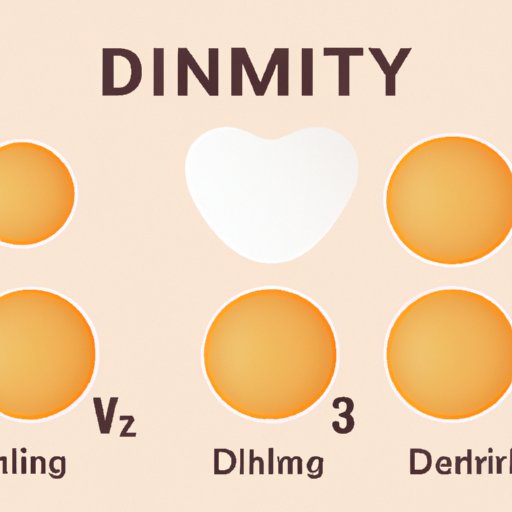
I. Introduction
Vitamin D is an essential nutrient that plays a vital role in overall health and well-being. It helps the body absorb calcium, which is important for bone health, and contributes to a healthy immune system. However, many people do not get enough vitamin D, and as a result, they may suffer from a variety of health problems. This article will explore the importance of vitamin D, how much you need, and the factors that contribute to your vitamin D levels.
II. The Benefits and Importance of Vitamin D: How Much Do You Need?
Studies show that maintaining healthy levels of vitamin D can have numerous benefits, including reducing the risk of osteoporosis, improving cognitive function, and aiding in weight loss. The recommended daily intake of vitamin D varies, depending on age, gender, and other factors. For adults, the recommended amount is between 600 and 800 IU per day, although some sources suggest that higher doses may be necessary.
III. The Science of Vitamin D: How Much Should You Take?
When sunlight touches the skin, the body synthesizes vitamin D, which is then metabolized by the liver and kidneys. However, certain factors can impact the body’s ability to produce vitamin D, including age, skin color, and where you live. Additionally, some foods are rich in vitamin D, including fatty fish, egg yolks, and fortified dairy products. While these sources can be useful in meeting the recommended daily intake of vitamin D, they may not be enough for some people.
IV. The Risks and Consequences of Vitamin D Deficiency: Recommended Daily Intake
Vitamin D deficiency occurs when the body does not have enough of the nutrient to function properly. This can cause a host of health problems, including weakened bones, increased risk of infection, and chronic diseases such as cancer and multiple sclerosis. The recommended daily intake of vitamin D varies depending on age, gender, and other factors such as whether you are pregnant or breastfeeding.
V. Age, Gender and Location: Factors that Determine How Much Vitamin D You Need
The amount of vitamin D a person needs can vary based on several factors, including age, gender, and where they live. For example, people who live in northern latitudes may need more vitamin D than those who live in sunny regions. Additionally, older adults require more vitamin D than younger adults, and women who are pregnant or breastfeeding have different vitamin D needs than those who are not.
VI. Foods Rich in Vitamin D: How Much to Consume for Optimal Health
While sunlight is the best source of vitamin D, there are several foods that are high in the nutrient. These include fatty fish, such as salmon and tuna, egg yolks, and fortified dairy products. However, the amount of vitamin D consumed through diet alone may not be enough to meet the recommended daily intake. In these cases, supplementation may be necessary.
VII. Conclusion
Vitamin D is an essential nutrient that plays a vital role in overall health and well-being. Maintaining healthy levels of vitamin D can reduce the risk of a variety of health problems, including osteoporosis, cognitive decline, and chronic diseases such as cancer. It is important to be aware of the recommended daily intake of vitamin D based on your age, gender, and location, and to consume foods that are high in the nutrient. For those who are not able to get enough vitamin D through diet and sunlight, supplementation may be necessary. It’s always best to talk to your doctor about your vitamin D levels and any concerns you may have.





